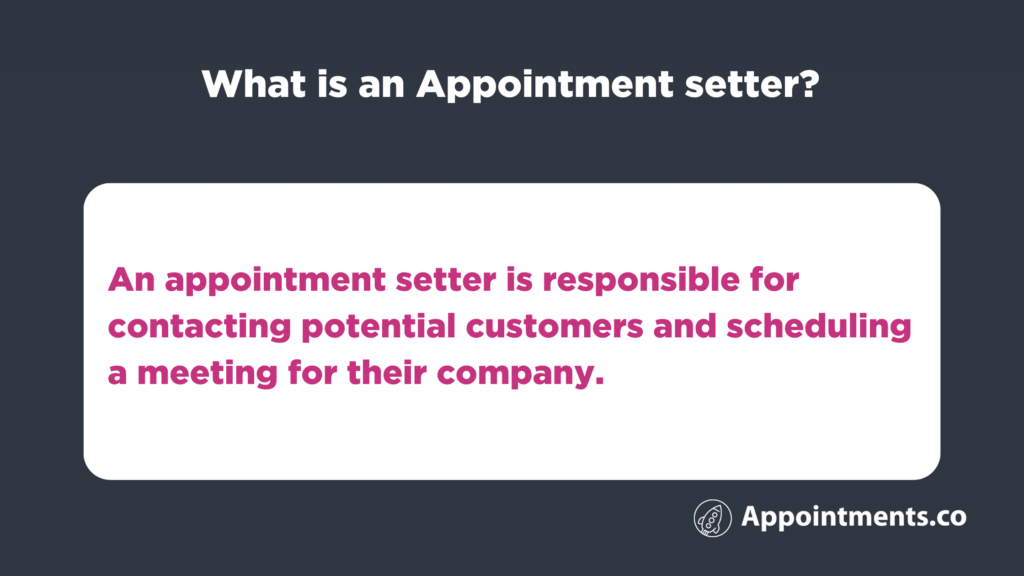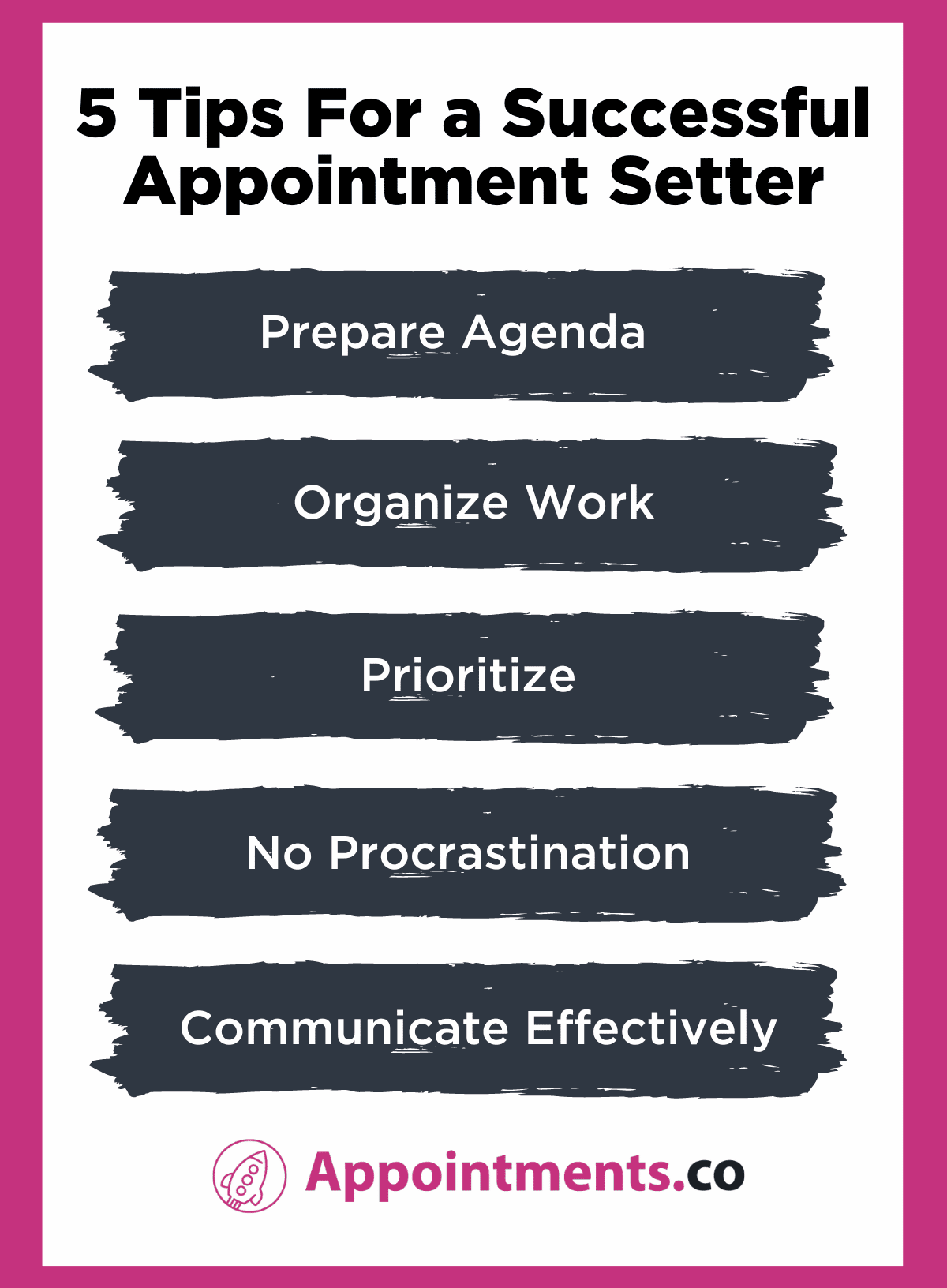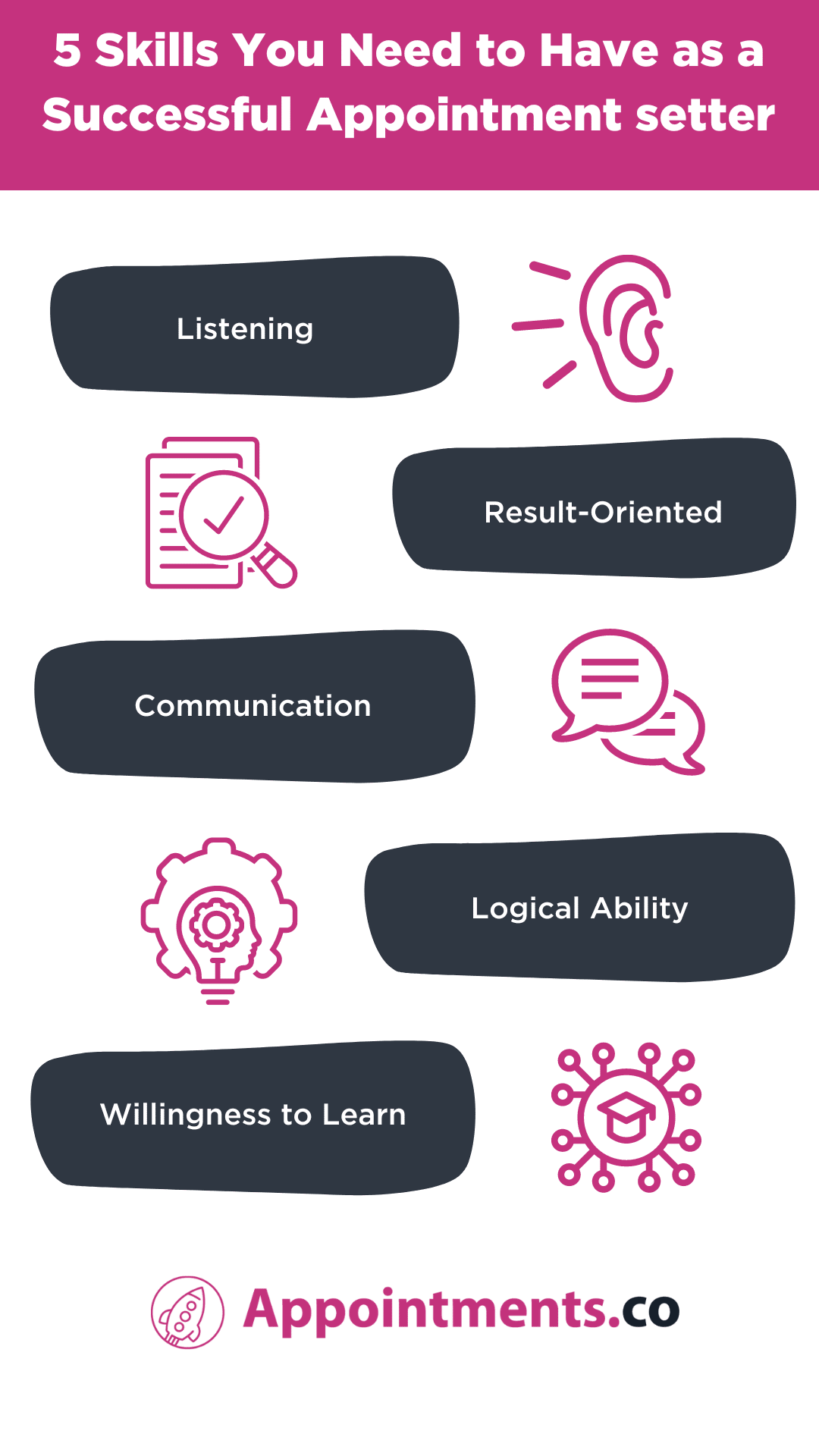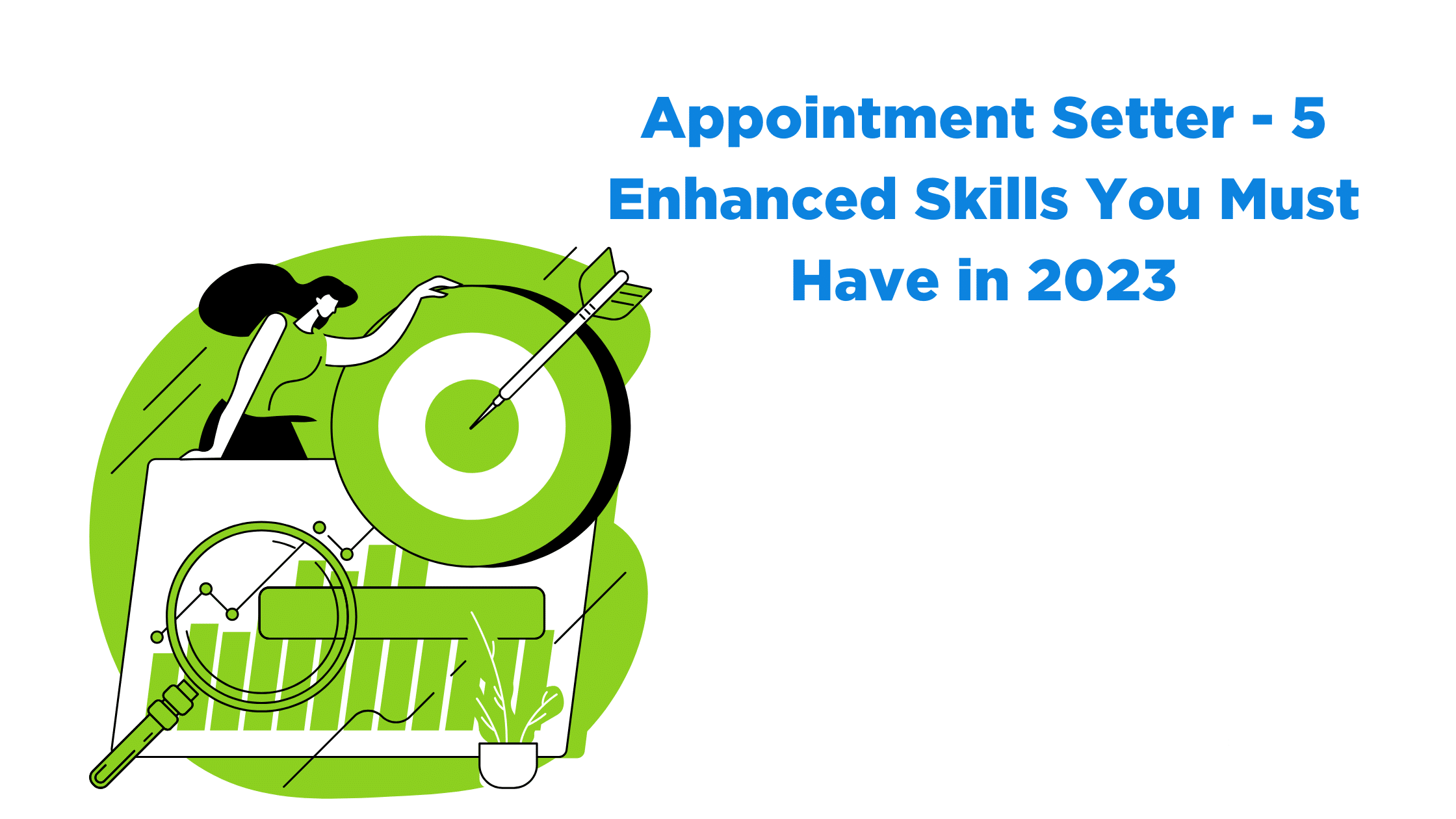Hiring an appointment setter makes your marketing and sales representatives invest their time in other crucial work, thereby increasing the closure of deals. Hence skills are crucial in setting up an efficient appointment setting service. This blog will elaborate on the desired skills required to be a successful appointment setter.
Table of Contents:
- What Is an Appointment Setter?
- What Does an Appointment Setter Do?
- 5 Tips for a Successful Appointment Setter
- The 5 Skills You Need to Have as a Successful Appointment Setter
What Is an Appointment Setter?
An appointment setter is responsible for contacting potential customers and scheduling a meeting for their company. They usually work in sales teams. They indirectly influence the sales in the organization. They play a part in scheduling meetings with prospective clients for a business, and their range of workload varies according to how the organization operates in the market.

What Does an Appointment Setter Do?
Appointment setters are professionals who know how to schedule appointments between the sales teams and potential clients through calls. They work directly with potential customers to make the deal.
They are entirely different from sales representatives as they have separate goals that they strive to achieve in this organization. Their goal is to identify prospective customers and schedule a meeting with the sales representatives. In contrast, the sales representatives interact with those prospective customers to help them purchase the product or services.
5 Tips for a Successful Appointment Setter

1. Prepare Agenda
The agenda is a version of the meeting plan shared with the meeting attendees to understand the purpose of the meeting before contacting the prospective clients and organizing the meeting.
The agenda is the list of things to be presented in the meeting. They create the agenda for scheduling the meeting and know the interest of the potential clients.
2. Organize Work
Organize your work to work with confidence and avoid confusion. Organizing can help manage work by reducing the cause of stress and increasing productivity to work effectively and efficiently.
Organizing can help to understand the tasks that weigh more. By doing this, you can finish the task according to the time frame.
3. Prioritize
Prioritizing enables you to simplify the process of finishing a task while helping to avoid multitasking. This allows you to focus on the things that matter, while reducing confusion when prioritizing tasks.
As an appointment setter, knowing which tasks are important enough when scheduling a meeting with a prospective client is essential.
4. No Procrastination
Procrastination is the act of delaying tasks until or beyond the end of the deadline. This does not help your productivity. The average person spends 55 days a year procrastinating. Planning helps avoid procrastination, and finishing work well in advance enables productivity.
Procrastination not only affects the day-to-day operations, but it can also affect potential clients due to delays in scheduling appointments, which affects growth.
5. Communicate Effectively
Communication can help develop interpersonal skills and enable a healthy relationship with prospective clients. It also helps to gather the interest of your prospective clients, which can result in sales. It acts as the key to building relationships with potential customers. An appointment setter is expected to have excellent phone etiquette to interact and pursue the interest of the potential customers to set appointments.
The 5 Skills You Need to Have as a Successful Appointment Setter

1. Listening
Listening enhances your ability to understand, and makes you a better communicator. It also enables and creates a more joyfully experience when speaking to you. Poor listening skills can lead to misinterpretations, and cause disputes among people, which can affect the relationship with your prospective clients.
Not just as an appointment-setter, but in any role, it is advisable to be at work on time, listen, and schedule appointments according to their interests.
2. Results-Oriented
Focusing on the outcome, rather than the process can help you achieve your goals easier. Schedule a meeting so they can produce information about the sale of a product or service.
Results-oriented displays help when scheduling appointments and finishing tasks within the time frame. It improves work efficiency and takes on more challenges in the future by increasing productivity.
3. Communication
Communication is a two-way process. It is always essential to transfer information to produce greater understanding. Hence, appointment setters are expected to communicate fluently and effectively. It develops the interest of prospective clients to interact more with the product or services.
4. Logical Ability
The logical and analytical ability helps an appointment setter solve problems effectively. An analytical mind helps with decision-making.They should be able to make decisions effectively according to the best interest of the prospective clients and businesses.
5. A Willingness to Learn
A willingness to learn is a desire to acquire new knowledge and develop further. It expresses the human desire, cheering, or readiness to learn new things and improve skillsets. It will ensure you grow and adapt to the dynamic world.
Appointment setters and appointment-setting companies work for experiences by learning new things and being interested in meeting prospective clients, which can develop relationships.
Frequently Asked Questions (FAQs)
1. Why do we hire an appointment setter?
Hiring an appointment setter who communicates with potential customers to schedule the meeting enables your sales representatives to focus on sales.
2. How to respond to a client who has to reschedule an appointment?
Rescheduling an appointment can be challenging to manage, but with the consent of people and an understanding of the terms, it is possible to reschedule.
3. What is the role of the appointment setter in marketing?
Appointment setters increase the chance of sales to the companies and serve as a tactic to gather the interest of key decision-makers in the industry.
4. How does the role of an appointment setter differ from that of a sales representative?
The main difference between an appointment setter and a sales representative is the goals. The appointment setter wants the potential customers to speak with the sales teams, whereas the sales representatives wish the potential customers to purchase the products and services offered.
Closing Thoughts
An appointment setter working with a professional and courteous disposition must be well organized and have a results-oriented mindset by maintaining an agenda. They are expected to have strong interpersonal skills, such as listening and communication, so they can have telemarketing calls with various potential customers. They initiate telephone conversations to support the sales process within the businesses they work for.
To sum up, their responsibilities include a good amount of customer relationships by enhancing their interest in the product or services offered. If you are looking for an appointment-setting service for your business, contact us!
Related Reads:
- Appointment Setting – The Ultimate Guide
- B2B Appointment Setting All You Need to Know
- Why You Need to Outsource Appointment Setting – 6 Benefits
Illustrations by Storyset



